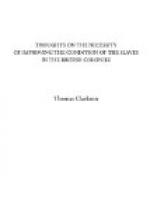He then pointed out other defects in the West Indian management, and their remedies. “I am of opinion,” says he, “that the West Indian planter should for his own interest give more labour to beast and less to man. A larger portion of his estate ought to be in pasture. When practicable, canes should be carried to the mill, and cane tops and grass to the stock, in waggons. The custom of making a hard-worked Negro get a bundle of grass twice a day should be abolished, and in short a total change take place in the miserable management in our West Indian Islands. By these means following as near as possible the East Indian mode, and consolidating the distilleries, I do suppose our sugar-islands might be better worked than they now are by two-thirds or indeed one-half of the present force. Let it be considered how much labour is lost by the persons overseeing the forced labourer, which is saved when he works for his own profit. I have stated with the strictest veracity a plain matter of fact, that sugar estates can be worked cheaper by free men than by slaves[16].”
I shall now show, that the old maxim, which has been mentioned, is true, when applied to the case of our West Indian islands, by establishing a fact of a very different kind, viz. that the slaves in the West Indies do much more work in a given time when they work for themselves, than when they work for their masters. But how, it will be said, do you prove, by establishing this fact, that it would be cheaper for our planters to employ free men than slaves? I answer thus: I maintain that, while the slaves are working for themselves, they are to be considered, indeed that they are, bona fide, free labourers. In the first place, they never have a driver with them on any of these occasions; and, in the second place, having all their earnings to themselves, they have that stimulus within them to excite industry, which is only known to free men. What is it, I ask, which gives birth to industry in any part of the world, seeing that labour is not agreeable to man, but the stimulus arising from the hope of gain? What makes an English labourer do more work in the day than a slave, but the stimulus arising from the knowledge, that what he earns is for himself and not for another? What, again, makes an English labourer do much more work by the piece than by the day, but the stimulus arising from the knowledge that he may gain more by the former than by the latter mode of work? Just so is the West Indian slave situated, when he is working for himself, that is, when he knows that what he earns is for his own use. He has then all the stimulus of a free man, and he is, therefore, during such work (though unhappily no longer) really, and in effect, and to all intents and purposes, as much a free labourer as any person in any part of the globe. But if he be a free man, while he is working for himself, and if in that capacity he does twice or thrice more work than when he works for his master, it follows, that it would be cheaper for his master to employ him as a free labourer, or that the labour of free men in the West Indies would be cheaper than the labour of slaves.




